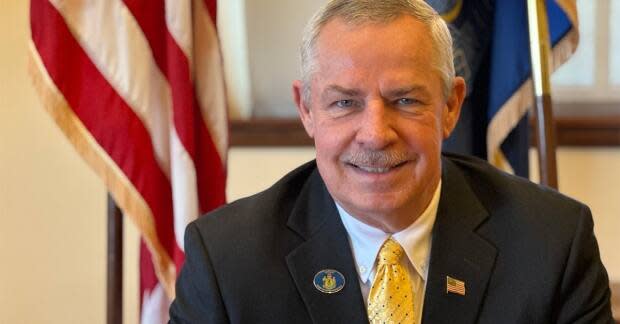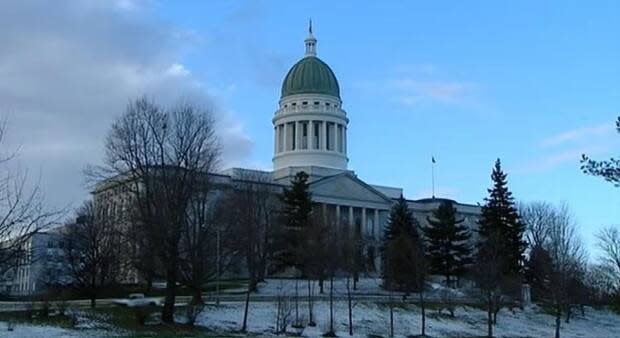Maine bill should halt sludge shipments to New Brunswick by next month

Shipments of thousands of tonnes of sewage waste from Maine into New Brunswick could stop around Canada Day thanks to legislation moving quickly through the state's legislature.
A committee of state representatives and senators recently approved a bill that would resolve problems at a massive landfill site near Bangor, ending the trucking of huge volumes of sludge to this province.
Committee member Rep. Mike Soboleski says he believes Maine's governor could sign the bill into law within two to three weeks.
"I think it will go through very quickly and it will get signed, and so we successfully have put an end to this problem for now," he told CBC News.

"Once that's been signed by the governor, 15 days later those trucks will stop. … I'm expecting wholeheartedly that within 30 days there won't be another truck crossing the border."
The bill will suspend until July 2025 a Maine law that created the problem.
The legislative fix won bipartisan support from Democrats and Republicans at a May 17 meeting of the Maine legislature's environment and natural resources committee.
That came after a public hearing on the bill May 8.
At that session, Brian Oliver of Casella Waste Systems, the operator of the landfill that's been shipping sludge to New Brunswick, said the bill was "essential to making this happen."
Casella started shipping 3,600 tonnes of sludge per month — about 130 truckloads — earlier this year.
The sludge is going to Envirem, a waste management company with several locations in New Brunswick.

CEO Bob Kiely pointed out in a text message that he predicted in March that the increase would be "short term." Envirem has had contracts with Casella for years.
How the sludge came to N.B.
A law that took effect in Maine on Feb. 8 banned the use of municipal sludge as agricultural fertilizer in the state over concerns it contained so-called "forever chemicals" known as PFAS that are considered a risk to human health.
The U.S. Environmental Protection Agency says exposure to certain levels of PFAS, or perfluoroalkyl and polyfluoroalkyl substances, have been linked by peer-reviewed studies to some cancers, decreased fertility, low birth weights and other effects.
The ban on sludge in farming forced municipal waste utilities to send more of their waste to Casella's Juniper Ridge landfill in Old Town.
But another state law banned the import of out-of-state bulky waste that the company needed to mix with the sludge and thicken it for burial at the site.

Without the bulk waste, there was a risk of surplus sludge spilling at the landfill, so Casella began shipments to Envirem.
The new bill will suspend the ban on out-of-state bulk waste for two more years to let the sludge be buried there.
Casella spokesperson Jeff Weld said in a statement that the bill "will give us and others the necessary time to continue to consider all options in developing an economically and environmentally sustainable solution to managing Maine's wastewater treatment sludge."
Higher costs
The impetus for Maine to end the shipments is higher fees Casella is charging to 30 municipal waste authorities to cover the extra shipping cost to New Brunswick — fees that the company says it will refund once the amendment takes effect.
Weld said Envirem was providing "an environmentally sustainable solution," but ratepayers in Maine deserved "a more consistent and economically sustainable solution with fewer variables than the current solution provides."
Several Maine state politicians at the May 8 hearing said they needed to act because Canada might ban the import of the sludge.
"Shouldn't we be trying to take care of more of our own rather than shifting the burden?" asked Rep. Dick Campbell. "What happens when Canada says we don't want your waste anymore?'"
Soboleski told the committee he had been "petrified" to do interviews with Canadian media in March because he worried bringing more attention to the shipments might prompt Ottawa to close the border to sludge.
Cracking down on PFAS
In fact, Ottawa released a draft report in May that proposed stricter regulation of PFAS entering Canada.
PFAS are chemicals used to make coatings that resist heat, oil and water and can be found in adhesives, packaging and non-stick cooking surfaces among other places. They do not break down and can accumulate in the body.
The Canadian Food Inspection Agency is looking at implementing new standards for PFAS in biosolids imported and sold as commercial fertilizer.
Alarm about PFAS in municipal waste led to the ban on its use on Maine farmland.
Envirem has said it is not using the Maine sludge in its retail compost products.
Kiely said in March the company is "very selective" about what it receives and recently added even more stringent standards to address "new and emergent concerns."
That includes allowing only "very low" levels of PFAS, he said.

Carleton University biologist David Miller, a leading expert on toxins, said the health risks of PFAS "are still not clearly defined" but appear to be worse with high levels of cumulative exposure.
He said he was surprised the provincial government seemed unprepared for the PFAS issue when the volume of imports increased earlier this year.
"People have been thinking about this for a long time," he said, questioning why the province didn't "do the simple things [such as] … let's find out where it's coming from. What's our strategy? Why are we taking somebody else's garbage when they won't take it themselves?"
An emergency measure
Soboleski called the situation "a perfect storm" caused by the legislature adopting the initial law with good intentions but without thinking through the consequences.
"It was just, 'stop doing it.' It didn't lead to any 'let's do some studies on this, let's see if there's a better way to do it. Let's see if there's a better way we can do an engineering study.'"
At the May 8 hearing, he publicly thanked "our great neighbours to the north in New Brunswick, Canada … for helping us through this difficult time and being patient while we scramble for solutions."
Soboleski, a Republican, said the bill has been labelled an emergency measure, which means it should speed through the legislative process and reach Maine's Democratic governor, Janet Mills, in two to three weeks.
"The governor's office has been fantastic in dealing with this. … The governor wanted to see this fixed," he said.
"This was a bad situation for us but we've got it under control and we're moving in the right direction, so thank you to everybody up there."

